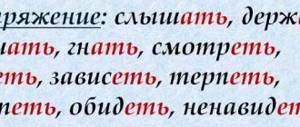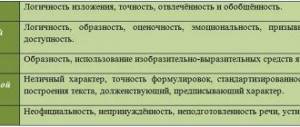Hyphen in adverbs before postfixes
1. The particles -that, -or, -form indefinite adverbs. We put a hyphen between the root of the word and the postfix:
- for some reason; for some reason;
- why - for some reason;
- when - ever;
- how - somehow;
- where - somewhere;
- somewhere, somewhere.
2. Similarly, the particle still acts as a derivational postfix and is written with adverbs with a hyphen:
- finally - finally agreed;
- again - again we'll be late;
- so - so we'll manage;
- I was completely—completely at a loss.
Download material
so UNT / Lesson plans for the Russian language / Lesson plans for the Russian language 7th grade
Lessons 84-85. Workshop “Hyphen between parts of words in adverbs”
14.12.2011 33670 2191
Lessons 84-85.
Workshop “Hyphen between parts of words in adverbs”
Objectives:
consolidate the skills of using a hyphen in different parts of: * speech; learn to distinguish adverbs with a hyphen from similar-sounding combinations of prepositions with nominal parts of speech; show the role of adverbs with a hyphen in texts of different styles.
Methodical techniques:
linguistic analysis, vocabulary dictation with mutual testing, stylistic exercises, work in groups, training exercises.
Progress of lessons
I. Vocabulary dictation with mutual testing
It’s cold like winter, I’m in a businesslike mood, on the tenth day of December, I did it willy-nilly, I forgot somewhere, I addressed it in a businesslike manner
I
question;
I’m getting better little by little; tenth, tidy up the room; It’s hot in Tsulsky, I’m reading in English, you’ll go somewhere, you’ve known for a long time, apparently and invisibly mushrooms, you live side by side with the school, repeated exactly; in my opinion, you are cowardly as a hare; ';you come from somewhere, they are located from right to left, you speak French, according to summer time, remember it firmly. II. Checking homework
1.
Talk about the use of hyphens in adverbs.
2. Exercise 256: complete the table “Hyphen between parts, words” on the board.
III. The use of adverbs with a hyphen in texts of different styles
Work in groups: representatives of five groups take turns reading texts of different styles, the rest of the students determine by ear whether the text belongs to a certain style, write adverbs in two columns: with a hyphen and without a hyphen.
Exercise:
record texts from dictation, determine their belonging to different styles;
explain the spelling of adverbs and
their role in the text. Write the adverbs in two columns: with a hyphen and without a hyphen.
1) — Hello, don't you recognize me?
- Wait, I saw you somewhere. I think you were in the same camp with me.
- No, I’m now studying with you in a parallel class. We recently moved, I live next to the school.
— That's why I see a familiar face, I barely recognized you.
Where are you going?
— Yes, somewhere. Secret.
(Conversational style.)
2) There is no consensus on the issue of the aspectual correlation of verbs and its display in dictionaries; in different dictionaries it is solved differently. In the first edition, this information was presented one-sidedly and incompletely.
(Scientific style. Dictionary of the Russian language in 4 volumes, edited by A.P. Evgenieva.)
3) A long time ago there lived a king in the world, and he had three sons. One day they came to their father and said: “Hello, Tsar-Sovereign, you didn’t order execution, you ordered him to say a word.”
(Artistic style. Fairy tale.)
4) Individual cells or areas of a sheet can be highlighted in different ways. Firstly, using frames. Frames can highlight cells with additional lines at the top, bottom, sides, and around the cells. Secondly, cells and areas of the sheet are highlighted using color.
(Formal business style. Instructions for computer users.)
5) Initially, we wanted to increase the wages of public sector workers by 37.5%. This figure was repeatedly mentioned by the head of the region, but then two amendments appeared. First, it is necessary to withdraw 380 million rubles from public sector sectors, which are being released due to the fact that a different method of indexing wages will be used. Secondly, we plan to increase wages by 21.5% in three stages. There is money in public sector sectors, but for some reason they are in no hurry to give it to public sector employees.
(Publicistic style. From a newspaper interview with a deputy.)
Adverbs occurring
in the texts
| With a hyphen | No hyphen |
| somewhere | Now |
| In my | recently |
| barely | side by side |
| somewhere | Where |
| differently | unilaterally |
| a long time ago | incomplete |
| once | above |
| differently | from below |
| Firstly | On the sides |
| With a hyphen | No hyphen |
| Secondly | Also |
| ' Firstly | initially |
| Secondly | repeatedly |
| for some reason | Then |
| due to this |
IV. Doing exercises
Exercise 255: on your own.
Homework
1.
§42.
2. Write out five sentences from works of fiction with adverbs, which are written with a hyphen.
See the downloadable file for the full text of the material.
The page contains only a fragment of the material.
Russian language lesson. 7th grade. Lesson topic: “Hyphen between parts of words in adverbs.”
Municipal budgetary
educational institution
"Secondary school No. 2 named after Hero of the Soviet Union Vasily Dmitrievich Revyakin
r.p. Samoilovka, Samoilovsky district, Saratov region"
Lesson notes on the Russian language.
7th grade.
«A hyphen between parts of a word in adverbs.”
Panasenko Valentina Ivanovna,
teacher of Russian language and literature
I
qualification category
Lesson topic:
“A hyphen between parts of a word in adverbs.”
Lesson type:
explanation of new material.
Lesson objectives.
1. Know the conditions for writing an adverb with a hyphen.
2. Be able to determine the conditions for placing a hyphen between parts of a word in adverbs.
3. Be able to distinguish adverbs from other parts of speech.
Equipment:
computer, multimedia projector.
Methods:
partially search-based, verbal-visual, problematic when discovering new material.
Techniques:
work with a textbook, table, cards, independent work, self-control.
Shapes:
individual, frontal, group, in pairs
1.Organizational moment (recording the number...)
2.-Which part of speech are we studying now?
-Take the worksheets, we work according to table No. 1. I will read out the statement, if you agree with this statement, then leave the number - the task number. If you do not agree, cross out the number - the task number.. When checking, justify your choice. Count up the points.
Is an adverb an independent part of speech? (Yes).
Does an adverb designate an object? (no: an adverb denotes a sign of action).
Is an adverb an adverb in a sentence? (Yes).
The adverb answers the questions: which, which, which? (no: where, to where, from where, how).
Does an adverb refer to a verb? (Yes).
Is an adverb a modifiable part of speech? (No).
Does an adverb have an ending? (No).
Does the adverb have 6 categories? (No).
:Where, where? where? how? why?why?when? - These are interrogative adverbs.
3
-.What topic did we study in the last lesson?
-What goals did you set for yourself?
The same goals are before us today in the lesson, because we continue to study the topic “Hyphen between parts of a word in adverbs.”
— When is a hyphen written in adverbs? (Rule)
4. Today we are talking about spelling adverbs. Which sentence is the fourth extra and why
.
1. The sun was shining (like) spring.
2. (That’s) why I wasn’t friends with them.
3. (First) I don’t agree with you.
4.He spoke (speak) German fluently.
Write down this sentence, underline the adverb as a part of the sentence. Why is this adverb written together? What adverb spelling falls under this rule?
Check your punctuation. Explain.
5. Work of the fishing rod.
Explain in writing the spelling of homonymous words
1.I am walking through the autumn forest, listening to the music of the falling leaves.
2.The leaves in the garden whisper like autumn. (Homophones)
6. At home you should have repeated the topic “ Hyphen in indefinite pronouns.”
From what pronouns are indefinite pronouns formed? What do you know about spelling indefinite pronouns? (Rule) (BOARD)
-Adverbs have the same category. Indefinite adverbs are formed from interrogative adverbs. Their spelling matches. ( PRESENTATION.)
Write down interrogative adverbs. Form an indefinite adverb based on the model of the pronoun.
7. PRESENTATION.
-What words are called complex? What complex word was encountered in the lesson? (leaf fall) PRESENTATION.
8.-Read the rules on page 114.
9.-Work according to table No. 2
Enter in brackets the number corresponding to the rule
| The hyphen in an adverb is written | The hyphen in an adverb is written |
| Anywhere, whenever – or | 1. After the prefix |
| Will – involuntarily, somehow | 2. Before the suffix - |
| For some reason, for some reason ( ) | 3. Before the suffix - |
| Rarely - rarely, high - high ( ) | 4. Before the suffix - |
| Somehow, sometime, ( ) | 5. If a complex adverb is formed by |
| From somewhere, somehow ( ) | 6. If a complex adverb is formed by |
| Ratings: 1. yours_ 2. partner_ 3. after checking ___ | Final grade: |
-Examination. Check in pairs.
10-Work in dictionaries. (Write down the last 2 words p. 115)
11. From exercise No. 278. write out phrases with adverbs using spelling chart No. 62 (part 2), label the spelling chart.
Work at the board.
12.Work using cards.
EXERCISE. Insert words that make sense.
Open the brackets and indicate the studied spelling. 1
.…… …….
In the woods. 2.
It’s inaudible, …………….
someone's paws are stepping on the loose snow .
3. …….
shallow traces are visible. 4.
……….
on the right, along with the wind, the hungry howl of wolves can be heard. 5.
You involuntarily remember the most terrible fairy tales.
Words for reference:
from where (that), (by) cat, (some) where, quietly (quietly)
— Check with explanation.
13. Filling the cluster.
14.Homework.P.44.Exercise No. 277
15.Lesson finale
| Lesson topic | Got it , didn't get it |
| Need to work on | 1 part of the spelling |
| 2 part of the spelling |





